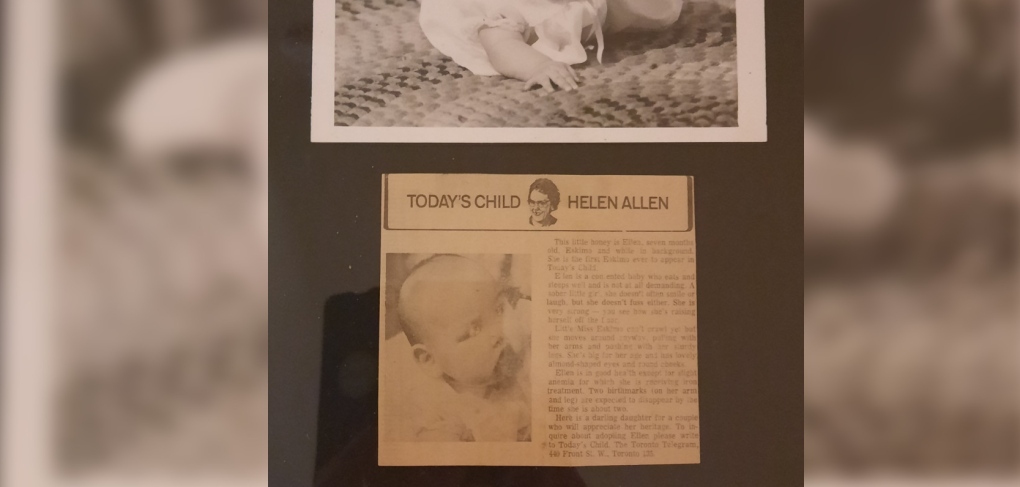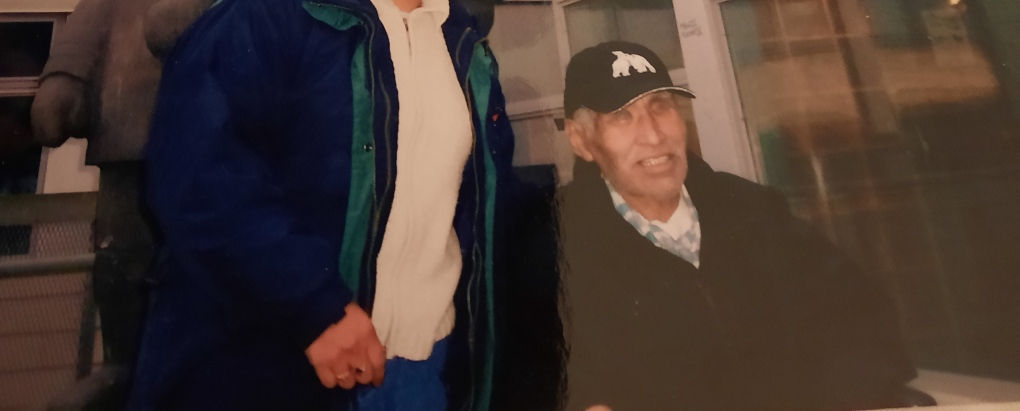'There are thousands of us': Sixties Scoop survivor shares story following National Day for Truth and Reconciliation
Tauni Sheldon is often referred to as “the picture-perfect baby” with full cheeks, almond-shaped eyes and sporting a frilly white dress.
The image of her as a baby was used in a Toronto newspaper back in 1970, which advertised her to prospective parents.
 The 1970 adoption ad for Tauni Sheldon, a survivor of the Sixties Scoop. (Courtesy: Tauni Sheldon)
The 1970 adoption ad for Tauni Sheldon, a survivor of the Sixties Scoop. (Courtesy: Tauni Sheldon)
"I did go to a very loving family, my adoptive family, my adoptive parents,” Sheldon told CTV News. “When they saw my adoption notice in a Toronto telegram, they knew that they wanted to adopt me."
The column was published not long after Sheldon was taken away from her mother on the day she was born.
"So, she held me for three hours knowing that I would be taken away and it took the next 22 years or so to find each other," she said.
She was removed from the remote Inuit community of Inukjuak on Hudson Bay, and ended up being adopted by a family who lived near Milton.
It was part of the Sixties Scoop, where thousands of Indigenous children across Canada were removed by child welfare authorities between 1960 and 1980 to be fostered or adopted.
"I was silenced and I didn't have a way to share my story or the experience of having a family in the south as well as well as meeting my family in the north," said Sheldon.
Ever since, Sheldon has been on a difficult and emotional journey to reconnect with her roots.
"There are thousands of us Inuit, we're part of the Sixties Scoop and Inuit voices, in the way of the Sixties Scoop, have not been fully heard yet," said Sheldon.
It was when she was in her early twenties when Sheldon found and met her birth mother through what was then known as the National Inuit Organization.
 Tauni Sheldon (right) with birth parents, Nellie Kumarluk and Etua Inuluk Tukkiapik.
Tauni Sheldon (right) with birth parents, Nellie Kumarluk and Etua Inuluk Tukkiapik.
"That was very emotional, we cried together, we hugged each other, we looked at each other,” she said. “I'm built like her in a lot of ways."
She met her birth father shortly after, who later died in 2007. Sheldon says while her father didn’t talk about it often, her family believes he was a survivor of residential schooling.
 Tauni Sheldo with birth father, Etua Inuluk Tukkiapik, in Quaqtaq, Nunavik in the 1990s, before he passed away in 2007.
Tauni Sheldo with birth father, Etua Inuluk Tukkiapik, in Quaqtaq, Nunavik in the 1990s, before he passed away in 2007.
"For Inuit and the government, separations for the Inuit divided all of us," said Sheldon.
Today, Sheldon is happily living with her husband of 20 years and her son near Guelph.
Her mission now is focusing on the need to connect with the sparse numbers of Inuit in Waterloo Region and Wellington County to further spread the message of reconciliation.
"Reconciliation is possible and our truth still must be heard,” said Sheldon . “I am one Inuk sharing my story while there are thousands of other people out there who have similar stories that also need to be heard."
Sheldon says this year’s National Day for Truth and Reconciliation has proven that conversations surrounding Canada’s history are being had, but believes much more work needs to be done on a local, provincial and national scale to better support Indigenous communities.
CTVNews.ca Top Stories

W5 Investigates 'I never took part in beheadings': Canadian ISIS sniper has warning about future of terror group
An admitted Canadian ISIS sniper held in one of northeast Syria’s highest-security prisons has issued a stark warning about the potential resurgence of the terror group.
'Absolutely been a success': Responders looks back at 988, Canada's Suicide Crisis Helpline, one year later
In its first year, responders for Canada's Suicide Crisis Helpline, known as 988, have answered more than 300,000 calls and texts in communities nationwide.
Prime Minister Trudeau meets Donald Trump at Mar-a-Lago
Prime Minister Justin Trudeau landed in West Palm Beach, Fla., on Friday evening to meet with U.S.-president elect Donald Trump at Mar-a-Lago, sources confirm to CTV News.
Nova Scotia PC win linked to overall Liberal unpopularity: political scientist
Nova Scotia Premier Tim Houston is celebrating his second consecutive majority mandate after winning the 2024 provincial election with 43 seats, up from 34. According to political science professor Jeff MacLeod, it's not difficult to figure out what has happened to Liberals, not just in Nova Scotia but in other parts of Canada.
'Mayday! Mayday! Mayday!': Details emerge in Boeing 737 incident at Montreal airport
New details suggest that there were communication issues between the pilots of a charter flight and the control tower at Montreal's Mirabel airport when a Boeing 737 made an emergency landing on Wednesday.
Hit man offered $100,000 to kill Montreal crime reporter covering his trial
Political leaders and press freedom groups on Friday were left shell-shocked after Montreal news outlet La Presse revealed that a hit man had offered $100,000 to have one of its crime reporters assassinated.
Questrade lays off undisclosed number of employees
Questrade Financial Group Inc. says it has laid off an undisclosed number of employees to better fit its business strategy.
Cucumbers sold in Ontario, other provinces recalled over possible salmonella contamination
A U.S. company is recalling cucumbers sold in Ontario and other Canadian provinces due to possible salmonella contamination.
Billboard apologizes to Taylor Swift for video snafu
Billboard put together a video of some of Swift's achievements and used a clip from Kanye West's music video for the song 'Famous.'


































